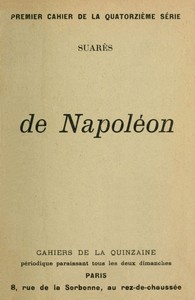| Summary |
"De Napoléon" by André Suarès is a reflective and analytical account exploring the complexities of Napoleon Bonaparte's character, actions, and legacy, written in the early 20th century. The text likely serves as a philosophical examination of Napoleon as both a historical figure and a potent symbol of power, ambition, and the human condition. Suarès delves into the paradoxes of Napoleon’s persona, portraying him as simultaneously admirable and reprehensible, as well as profoundly influential in shaping modern statecraft and military strategy. The book presents a vivid portrait of Napoleon, dissecting his motivations, relationships, and the societal context from which he emerged. Suarès highlights Napoleon's unique blend of ambition and calculation, portraying him as a masterful yet cold strategist, whose decisions often prioritize power and order over human compassion. The narrative reflects on his connections to France, the impact of the Revolution, and the cultural and historical identities intertwined with his legacy. Through intricate prose, Suarès invites readers to grapple with the enduring question of whether Napoleon was a tragic hero or a ruthless usurper, ultimately revealing the intricacies of a man who wielded extraordinary influence over Europe and whose ideals continue to resonate in contemporary discussions about power and leadership. (This is an automatically generated summary.)
|

